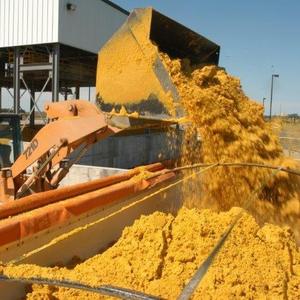DDGS market boosted by soymeal prices, Chinese buying

PHOTO:BBI INTERNATIONAL
May 23, 2016
BY Sean Broderick, CHS Inc.
Nearby markets are tight, and the deferred months are being quoted at a discount. Most users in the U.S. have DDGS in the rations to the maximums and we are beginning to see that in overseas markets as well.
Domestically, the futures run up that occurred in the middle of May gave buyers some pause, putting a hold on their buying. Now, with the pipelines running thin, they are collectively coming to the market for their next week’s needs and pushing the market up on themselves. Nearby values are a premium, a dynamic that has been that way for quite a while.
In the export markets buyers are even more in denial about prices moving higher than domestic folks and are scrambling to find alternatives-in a market where few exist. In China, there is talk about a release of some of the corn they have in reserve-at market prices-but that has yet to be seen. With the price of soymeal, demand is coming in from most of the Pacific Rim. They feed many more monogastric animals (hogs/poultry) that are in need of protein, and DDGS is a viable alternative.
Advertisement
Advertisement
Overall, it feels like the market will stay elevated. Higher DDGS prices are increasing ethanol plant margins, and would expect to see full production. Higher soymeal prices will remain the driver for a while, but Chinese buying decisions and crop conditions will soon start to be what buyers are watching.
July 2016 June 2016 July .2015
MN 135 120 160
Chicago 168 140 185
Advertisement
Advertisement
Buffalo 160 140 175
CA 200 179 214
Florida 170 155 204
Related Stories
The U.S. exported 31,160.5 metric tons of biodiesel and biodiesel blends of B30 and greater in May, according to data released by the USDA Foreign Agricultural Service on July 3. Biodiesel imports were 2,226.2 metric tons for the month.
CARB on June 27 announced amendments to the state’s LCFS regulations will take effect beginning on July 1. The amended regulations were approved by the agency in November 2024, but implementation was delayed due to regulatory clarity issues.
Legislation introduced in the California Senate on June 23 aims to cap the price of Low Carbon Fuel Standard credits as part of a larger effort to overhaul the state’s fuel regulations and mitigate rising gas prices.
The government of Brazil on June 25 announced it will increase the mandatory blend of ethanol in gasoline from 27% to 30% and the mandatory blend of biodiesel in diesel from 14% to 15%, effective Aug. 1.
The U.S. EIA reduced its 2025 and 2026 production forecasts for a category of biofuels that includes SAF in its latest Short-Term Energy Outlook, released June 10. The forecast for 2025 renewable diesel production was also revised down.
Upcoming Events









